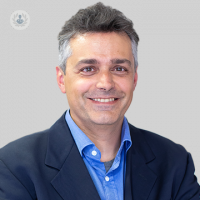My child has chest pain! Should I be worried about their heart?
Written in association with:The chest is packed with many vital structures and therefore it is not surprising that chest pain in a child or adolescent is very worrisome for parents. When should you consult a doctor? Leading paediatric cardiologist Dr Alessandro Giardini is here to explain.

Chest pain in children and adolescents is a common worry for parents and forms a large part of a paediatric cardiologist’s work.
The heart and the lungs occupy the chest space and they are wrapped and literally protected by a complex structure composed of bone (ribs and front chest bone or sternum), cartilage, and muscles (pectoral muscles and intercostal muscles). This structure, the chest wall, is the most common site of chest pain in children and adolescents.
Chest wall pain is generally sharp, and can last from a few seconds to a few days, changing with breathing, coughing, or compression on the chest. It often improves with medications such as paracetamol or ibuprofen which improve inflammation.
Non-cardiac causes of chest pain in children
Strain on the muscle and bones, trauma and inflammation are the most likely causes.
Other non-cardiac causes of chest pain include:
- Viral or bacterial chest infections – particularly if the child has an intense cough
- Acid reflux – some children who have acid reflux from the stomach into the oesophagus (food pipe) cannot describe their symptom in another, more articulate way.
- Stress/anxiety – chest pain or tightness is associated with a faster heart rate as a result of the anxious state.
With the exception of acid reflux, which sometimes can be triggered by exercise, non-cardiac chest pain generally occurs at rest.
Cardiac causes of chest pain
Cardiac causes of chest pain are less common and are generally associated with other symptoms:
- Fatigue
- Breathlessness
- Dizziness/fainting – particularly during or immediately after exercise
- Vomiting
- Loss of appetite
- Pallor/cyanosis
- Fast heart rate
Heart conditions that can cause chest pain in a child or adolescent include:
- Pericarditis (inflammation of the space around the heart)
- Myocarditis (inflammation of the heart)
- Arrhythmias
- Increased strain on the heart chambers (e.g. related to a narrow valve)
- Insufficient oxygen supply to the heart as a consequence of either an increased oxygen requirement (increased muscle mass, as in hypertrophic cardiomyopathy) or narrowing or another problem with the coronary arteries (the small arteries that carry oxygen-rich blood to the heart tissue) due to either congenital anomalies or acquired problems like in Kawasaki disease.
As the heart and lungs are essential to life, parents often worry that there could be a problem with the heart or lungs when their child complains of chest pain. However, chest pain of cardiac origin is less common than musculoskeletal causes and other causes for the chest pain other than cardiac can be identified in most children.
You should never ignore chest pain in a child, especially during exercise, if there are other symptoms, or if there is a family history of heart problems.
The work of paediatric cardiologists
One reassuring fact is that cardiac causes of chest pain can be easily identified by experienced paediatric cardiologists. Taking a detailed history of the complaint and a thorough examination is generally enough to suggest a non-cardiac cause. If the GP or paediatrician examining the child is unsure about the cause of chest pain, your child will be referred to a paediatric cardiologist for specialist assessment.
The paediatric cardiologist will listen to your child’s heart and ask you and your child questions about the circumstances that are associated with the chest pain, your child’s previous and recent medical history, and the medical history of the family. He will also generally perform an ECG (a recording of the electrical activity of your child’s heart) and an echocardiogram (a detailed ultrasound scan of the heart) in order to confirm a normal heart anatomy and function.
Sometimes, the paediatric cardiologist might recommend some further testing, such as an exercise stress test, some longer recording of your child’s heart rhythm (24 hour ECG) or some further more detailed imaging of the heart. However, the majority of children will not need any further testing as they will likely be found to have a completely normal heart.
Visit Dr Giardini's Top Doctors profile to book an appointment or learn more!


